Ethical Business Practices – Dealing with Chargebacks
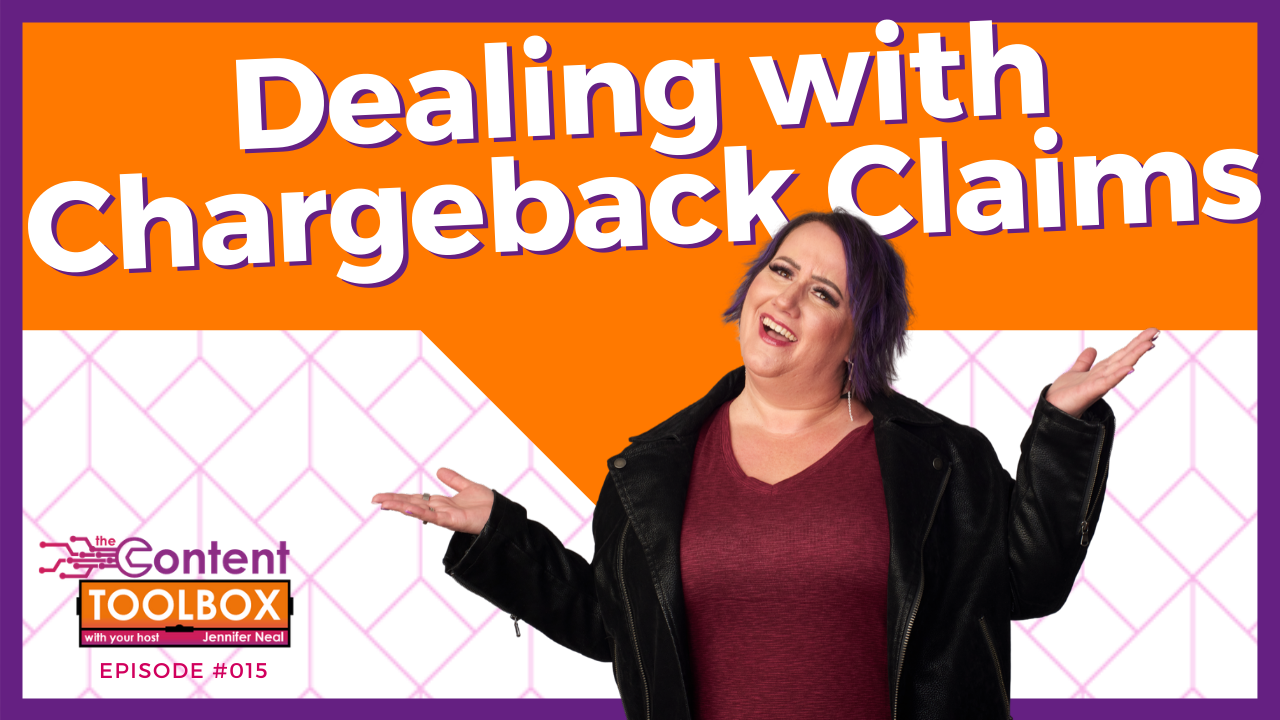
You base your business on having ethical business practices. Sometimes, tough customers and chargebacks can make this challenging.
Quick Links:
- TIP: How to implement ethical business practices in your busines [Infographic Download]
- Episode Overview – Dealing with Chargeback Claims
- Personal Note from Jenn Neal on Ethical Business Practices
- Episode audio [Podcast on Spotify]
- Blog Post – Ethical Business Practices – Dealing with Chargebacks
- Related Posts
TIP: How to implement ethical business practices in your business.
Time needed: 5 minutes
TIP: What to Do When a Client Becomes a Nightmare
- Did you very clearly establish the expectations?
If Yes – refer back to those expectations and make the contract or terms the bad guy, explain how they are wrong but in a nice way – if they still suck, fire them
If No – sympathize and explain how they are wrong – do what you can to make it better and use this as a reason to set new terms and expectations for future work - Stick to your decision.
Be respectful and demand respect.
- Document EVERYTHING
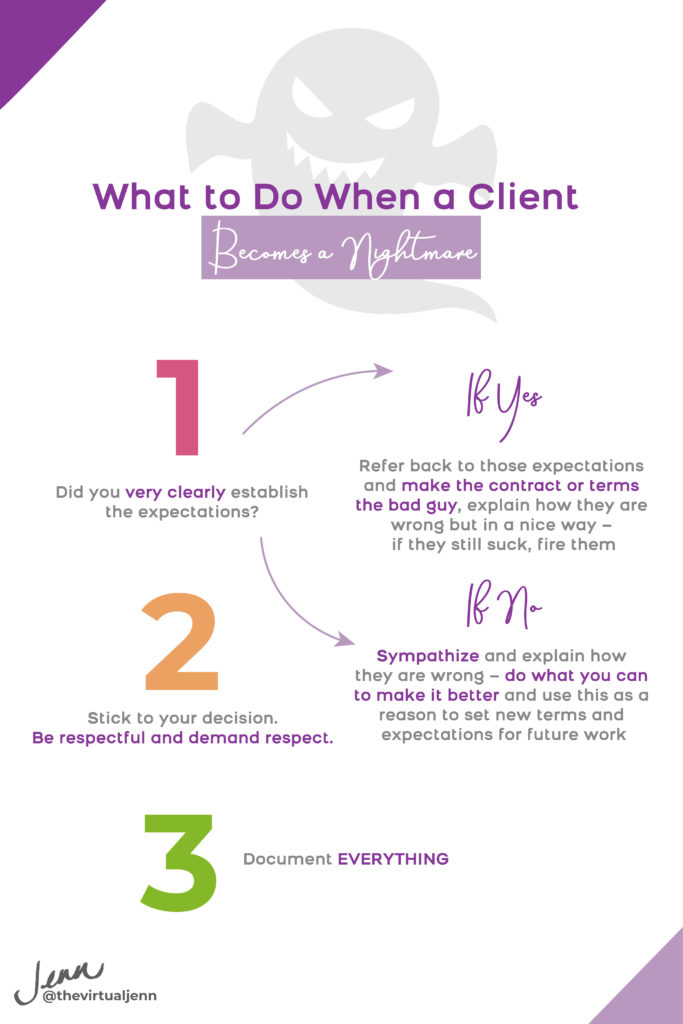
What’s In This Episode
I detail my first chargeback experience in this episode. I talk about setting expectations. And I talk about the emotional turmoil of settling things with the customer.
It’s not always easy doing the right thing. But we still have values, even in this crazy world. I dive deep into the issues around the customer being wrong.

Jenn Neal on ethical business practices
When I end up on the receiving end of an angry customer I immediately go to mad… It takes a lot of work to not just fire back.
-Jenn Neal
Let me tell you a story about that time I learned how to patch a hole in drywall.
It all started with my temper.
I had a pretty awesome one growing up. It was big and nasty and kind of developed a personality of it’s own.
The more I became known for my short fuse, the more people expected it of me and it kind of became this vicious cycle.
This time, however, I believe it was something about my little brother picking on me and never getting in trouble – and I demanded punishment to him as retribution.
He always picked and picked and picked – it was like the tiniest little things that you couldn’t ever get in trouble for – but they added up.
My dad used to say that I was like a little teakettle and he just steamed me up and up and up and then I’d blow. Pretty accurate illustration, actually….
This time I was demanding something like he needed serious punishment OR ELSE.
When called out on what was the OR ELSE, my head went to the closest thing I could find. Without really thinking it through…
“OR ELSE I’ll punch this wall”
So the kid went scott free (Sorry Bro!) and I unleashed my fist into the wall.
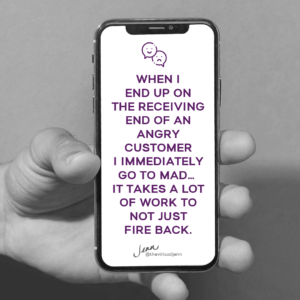
When I end up on the receiving end of an angry customer I immediately go to mad… It takes a lot of work to not just fire back.
Luckily I didn’t break any bones.
And no – I didn’t actually break the drywall but I did soften it up so it had to be repaired later on. My dad had me help do the repair so I could learn, and figured it made sense since I had done the damage, so to speak.
BUT
If I had just lead with that the story would have lacked a certain, something. 😊
AND
To be clear. I did out grow my adolescent impatience after many years + a bunch of self work + a ton of therapy…
Anyway, why am I talking about my temper and punching holes in walls?
Because, when I end up on the receiving end of an angry customer I immediately go to mad. It takes a lot of work to not just fire back – but that’s exactly what I address in this episode. Nightmare clients and dealing with chargeback issues. Not fun, but here we go.
Jenn “wall knuckles” Neal
Ethical Business Practices – Dealing with Chargebacks
You base your business on having ethical business practices. Sometimes, your ethics are challenged by customers. You know the saying the customer is always right? Well, I beg to differ. Dealing with unsatisfied customers is one of the most painful parts of entrepreneurship. We all want to do a good job- I hope! But no matter how conscientious you are, you’re bound to deal with clients and customers who simply will not be satisfied. Here, we want to spend some time considering how to deal with these situations. It’s an important part of delivering good customer service. But it’s also part of how we maintain our sanity.
Entrepreneurship Survival: Handling Chargebacks, Tough Customers & Delivering on Your Value Proposition
Let’s face it. We can’t please everyone! The more customers you serve, the more likely it is that you’ll get complaints. With complaints come changes to the original order, revisions to the original request, and alterations of the plan. It also means changing deadlines, longer days, and often- strained communication. You want to come through with great value, but you also need to respect your own time and be able to stand up for yourself. That means striking a balance between great customer service and self-respect. Getting it right is good for your brand, good for your sanity, and good for your bottom line.
You are the expert at what you do. So it shouldn’t be a great surprise if your customer fails to communicate exactly what they want. This can be frustrating, but it’s understandable and part of doing business. Your clients can’t be expected to fully understand your process, the barriers to your production methods, or the challenges of your craft. This is why they are doing business with you! So when the customer needs a change and is acting in good faith, it’s usually best to make the change. Also, it’s always possible that the mistake is on our end. When this happens, we should admit it immediately and take reasonable and timely steps to remedy the problem.
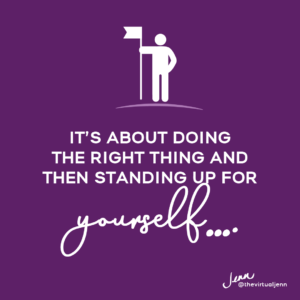
Handling Complaints & Change Requests
Chargebacks can happen in any business. For example, there was one time that my company agreed to complete a website project for a new customer. The customer already had work completed by someone else. Rather than starting over, we agreed to pick up where the other company had stopped. We worked hard to deliver the project on time, but due to the amount of work, we were late on the deadline. Because we were late, I didn’t hesitate to help when the client asked for changes. We worked another month on the project.
During the month, the project took a turn. The customer had a whole new vision, and the amount of work increased. At this point, we were no longer making small changes. We were working on a completely different project. I contacted the customer and let them know that I was extending my warranty. At the end of this period, they would receive a final invoice. In turn, the customer ended the project and felt like they shouldn’t pay for the extra work we did. As a result, the client issued a charge back. Fortunately, I was able to prove that I did complete the scope of work promised. The chargeback was reversed.
Change and Chargeback Requests
Unfortunately, it’s inevitable that some customers will not be satisfied no matter what you try or how hard you work. Sometimes, the customer’s vision changes and it may not always fall under the scope of what you were hired for. Other times, their expectations differ from what they hired you to do. With any scenario, it’s best to accept that these things happen and to gracefully minimize the situation’s ability to drain your time and energy. In any case, it’s important to stand up for what is right. (In my case, as uncomfortable as I was, I stood up for myself and my business.)
If you are being asked to make repeated changes, to spend exorbitant amounts of time doing work that’s contrary to or not included in the original request, it’s time to consider your options. It may be beneficial for you to sit and speak with the client, and advise that more work is going to be more money – and renegotiate the price you’re charging. If the customer simply isn’t happy, it may be best to move on from them. The right client will value your time. They will not feel as if they shouldn’t have to pay more for you to complete more work.
In many cases, although you’ve completed the hours towards the work you were hired to do (or have completed the project as a whole), the customer may create a chargeback. Meaning, that they don’t feel that they should have to pay for the services since it wasn’t exactly what they wanted. This doesn’t mean that you will lose money from the project though. When a chargeback occurs, the business owner is allowed to provide information to show that they did in fact complete work, and deserve the pay that they received. If you can show that you have acted in good faith, gone above and beyond to service the account well, then you should be able to get chargebacks adjudicated in your favor.
Most importantly, time is money, and the more time you take away from working, the more your business is hurting. A simple time-cost analysis can reveal whether or not the account is worth your time. Also, a reasonable assessment of the emotional cost of continuing to service a disrespectful person can show you whether or not keeping the account is worthwhile.
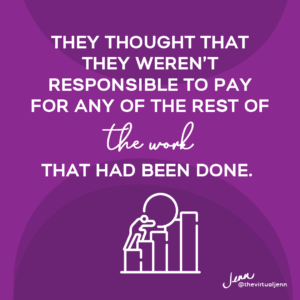
Dealing With Chargebacks
Again, chargebacks can happen even when everyone is acting in good faith. When this occurs, we should do our best to maintain good relations with the client. If their continued custom is a reasonable possibility, it could be in your best interest to go above and beyond to offer them extra value.
When chargebacks do happen, we should take steps to make them less likely to occur in the future. Here are some important steps to take.
1. Identify the Problem
Did the chargeback happen due to a product defect, a delivery problem, or an error on the customer’s part? Is the client being reasonable? You need to pinpoint the cause of the problem and address it quickly. This is important for customer relations. But it’s also an important way to maintain a good relationship with your payment processor.
2. Prevent Recurrence
Taking industry-specific steps to prevent or prepare for it to happen again is key.
3. Consider Tactical Representation
Decide if the source of the chargeback is likely to happen again. If so, partnering with a claims representative might be a smart investment.

Respecting Your Time & Emotional Self Defense in Entrepreneurship
Doing business is all about protecting and growing your productivity. Taking care of your emotional assets is no small part of that.
Delivering great customer service is good for your sense of pride. It energizes your ability to deliver the goods. But if the client or customer is not acting in good faith or does not respect your time, then your sense of dignity may be on the line. If, after an honest appraisal of the account, you determine that it’s not worth it- you owe it to yourself to cut your losses. This is an important part of how we curate a customer base that’s worth having, and it makes your valued customers stand out so much more.
If you found this discussion valuable, check out my Formula Done video on the subject, here. There’s no end to the ways we can learn to boost productivity, curate entrepreneurial momentum, and make more sales more often. So I hope you’ll join me there!
Related Posts
How To Develop An Entrepreneurial Mindset – Examples of Gratitude


